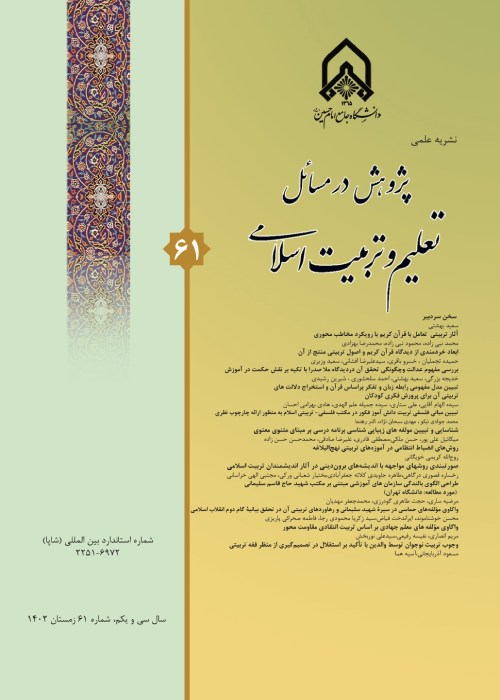Identifying the Components of Spiritual Training in Religious (the Holy Quran) and Non- religious Teachings: Compatibility with the Upstream Documents of Curriculum Designing
This study is aimed at identifying the components of spiritual training in religious (the Holy Qur’an) and non-religious (secular) teachings and their adaptability with the upstream documents of curriculum designing. The research follows a qualitative content analysis. The statistical population of the research includes the Holy Qur’an and its thematic interpretation by Ayatollah Hashemi Rafsanjani in Qur’anic teachings section. Regarding the teachings of secular designing of curriculum, it includes the books and articles in the field of spiritual training and the document of fundamental transformation of education and the document of national curriculum designing. Due to the nature of the research, the sample size is equal to the whole population. The data collection tool is composed of a checklist of Qur’anic verses, documents related to spiritual training from the views of secularism, as well as upstream documents of the Iranian curriculum designing. To confirm the validity of the checklist, the content validity method was employed by referring to the supervisor as well as the professors of the Department of Educational Sciences at the University of Tabriz. Lawshe agreement coefficient was used to confirm the reliability of the tools, and quantitative content analysis was employed for data analysis. The unit of analysis included verses, statements, and phrases in the sources. In the findings section, first the concepts of spiritual training in the form of doctrinal, moral and practical components were extracted from the Qur’anic teachings as well as the secular teachings. Findings showed that in the analysis of the Holy Quran, five concepts (principles of religion), moral component (moral virtues: 88 concepts, and moral vices: 82 concepts), and practical component 8 concepts (from the peripheral principles of religion) were identified as faith components. The degree of similarity between the components of the Qur’anic features and those of secularism were quite low. In contrast, their differences were very high. Furthermore, adaptation of the components of Qur’anic teachings with the upstream documents of the curriculum designing was very high. However, the components of secularism were not compatible with the upstream document of the Iranian curriculum designing. Therefore, the upstream documents of the Iranian curriculum designing, if complying with the Qur’anic teachings in the field of spiritual training, can be an effective source for spiritual training in the educational system.
- حق عضویت دریافتی صرف حمایت از نشریات عضو و نگهداری، تکمیل و توسعه مگیران میشود.
- پرداخت حق اشتراک و دانلود مقالات اجازه بازنشر آن در سایر رسانههای چاپی و دیجیتال را به کاربر نمیدهد.


